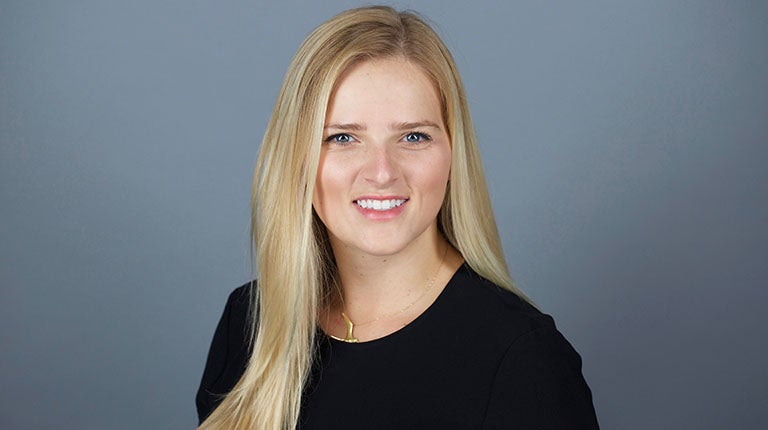Environmental Advocate, Alumna Wins Rhodes Scholarship

Deirdre Collins (C’17), a biology researcher and advocate for clean energy and environmental causes, has been named a 2018 Rhodes Scholar. She is the 26th Georgetown alum to win a Rhodes Scholarship. (photo courtesy Deirdre Collins)
November 30, 2017 – Georgetown College alumna Deirdre Collins (C’17), who hopes to work to promote environmental preservation and sustainable development, has been named a 2018 Rhodes Scholar.
Collins, a native of St. George’s, Bermuda, will use the scholarship to pursue a M.Phil in environmental change and management at the University of Oxford, beginning next fall.
A biology major at Georgetown, Collins received the only Rhodes Scholarship awarded to a Bermudian this year.
“On behalf of our entire Georgetown community, I wish to congratulate Deidre on this extraordinary achievement,” said University President John J. DeGioia. “We look forward to the many contributions she will make to our global community as she engages more deeply in her studies in environmental science at Oxford.”
DNA and Mars
Collins excelled in the classroom during her years at Georgetown and impressed her professors from the start.
“She tackled every aspect of the [Foundations of Biology] course with intellectual vigor, mastered the work at hand, and then pushed of her own accord to reach a level of understanding far beyond what we expected,” biology professor Heidi Elmendorf wrote in a recommendation for Collins’ Rhodes candidacy.
Collins eventually served as a research assistant in the Johnson Biosignatures Lab led by Sarah Stewart Johnson, a Rhodes scholar herself and an assistant professor of planetary science with the Department of Biology and the Science, Technology and International Affairs program.
The student helped Johnson extract DNA in soil samples from regions of Western Australia thought to be similar to Mars. Such research may one day help solve the question of whether there was ever life on that planet.
Inspired by Faculty
During the summer of 2016, Collins traveled to an icefield in Juneau, Alaska and British Columbia as part of the Foundation for Glacier and Environmental Research’s Juneau Icefield Research Program.
While on the icefield, she conducted original research on alpine ecology and went on present her analysis on the topic to the American Geophysical Union — the world’s largest Earth and space science conference.
“The classes I took and the faculty I met at Georgetown were instrumental in helping me to engage in scientific field research,” Collins said. “They inspired me to wholeheartedly dedicate myself to a career in fighting climate change.”
Environmental Advocacy
While her classes at Georgetown helped develop her interest in ecology, Collins became interested in the environment at a young age.
“My initial interest in environmental issues came from growing up in Bermuda, a 21-square-mile island that is particularly vulnerable to the effects of increased storm surge, sea level rise, and the rising ocean and air temperatures that accompany climate change,” she said.
Her field work experience helped drive home the immediacy of the climate change threat — the icefield she worked on, for example, is at risk of melting entirely within 150 years.
Facing the Anthropocene
“I find myself forlorn with nostalgia for a time when coral reefs and glaciers functioned imperviously to human impact — a time I have never experienced,” Collins wrote in her personal statement for the Rhodes. “In each of these instances, I am unfailingly reminded of a time before the Anthropocene, when the Earth’s condition was not contingent on human activity.”
Collins’ dedication to environmental work didn’t end when she graduated. After returning to Bermuda, she became a certified scientific diver with the American Association of Underwater Sciences.
She currently serves as in investment analyst for the New York Green Bank, a $1 billion state-sponsored fund that invests in clean energy.
Renaissance Woman
Collins maintained a diverse set of academic interests and remained active in student life and co-curricular activities throughout her undergraduate career.
She served in multiple editorial positions at the student newspaper, The Hoya, where she sought to develop and maintain effective writing skills.
“I wanted to continue to develop myself as a writer despite my choice to major in biology,” she said. “I knew that writing would always be important and necessary to whatever career path I chose.”
Collins held leadership positions at GlobeMed, a network of students partnering with grassroots organizations to carry out public health projects. She also volunteered with Georgetown’s After School Kids Program.
A French minor, she spent a semester abroad in Lyon, France, where she concentrated in African studies and tutored English on a weekly basis.
“She embraced Georgetown’s mantra of ‘men and women for others,’ ” Elmendorf wrote. “Deirdre is a modern-day Renaissance woman.”
A LASTING IMPACT
Collins hopes that her Oxford education will help her pursue her dreams of facing one of the world’s greatest challenges head-on.
“I am driven to study climate change as it relates to politics, business economics and climate science because it poses an enormous threat to every continent on the planet,” Collins said. “We have never seen a global issue quite like climate change. The decisions we make today will impact us decades down the line.”
Georgetown has now produced 26 Rhodes scholars, including President Bill Clinton (SFS’68).
The all-female group of Georgetown finalists this year also included four women from the United States and one from China.